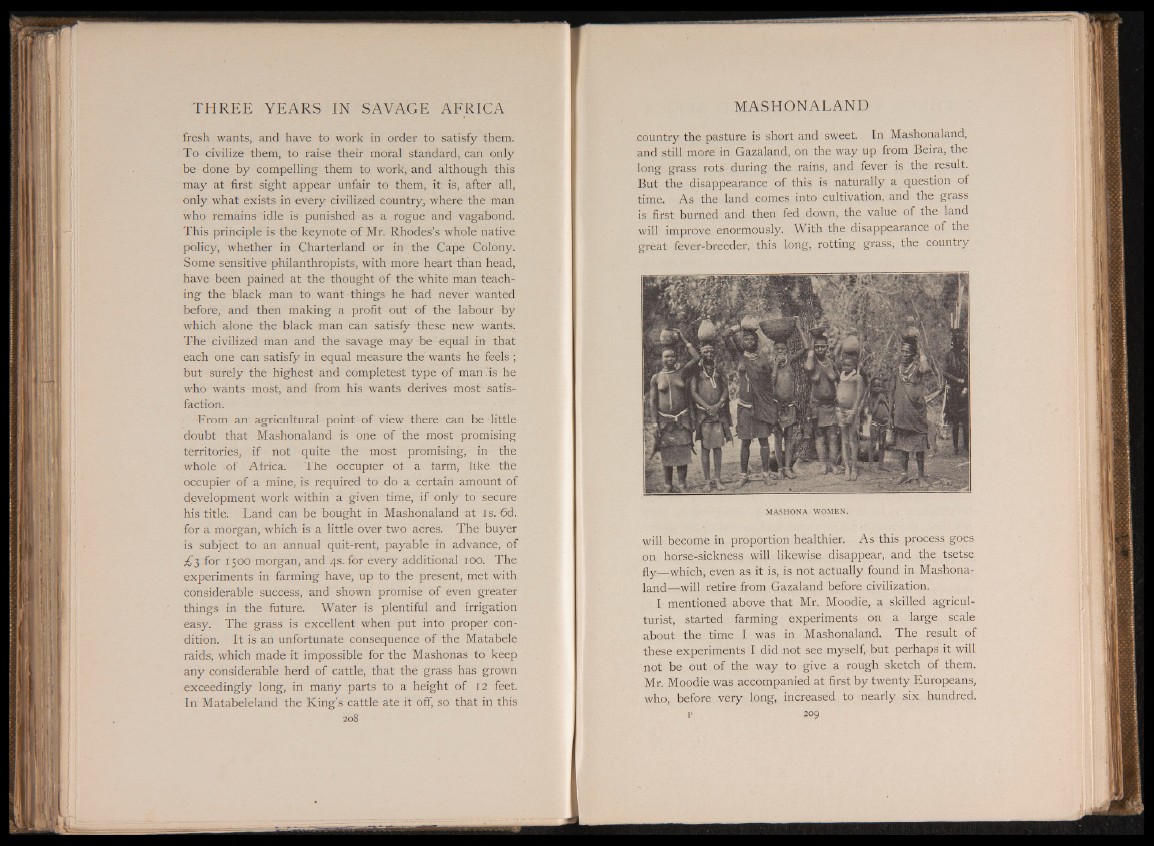
fresh wants, and have to work in order to satisfy them.
To civilize them, to raise their moral standard, can only
be done by compelling them to work, and although this
may at first sight appear unfair to them, it is, after all,
only what exists in every civilized country, where the man
who remains idle is punished as a rogue and vagabond.
This principle is the keynote of Mr. Rhodes’s whole native
policy, whether in Charterland or in the Cape Colony.
Some sensitive philanthropists, with more heart than head,
have been pained at the thought of the white man teaching
the black man to want things he had never wanted
before, and then making a profit out of the labour by
which alone the black man can satisfy these new wants.
The civilized man and the savage may be equal in that
each one can satisfy in equal measure the wants he feels ;
but surely the highest and completest type of man is he
who wants most, and from his wants derives most satisfaction.
From an agricultural point of view there can be little
doubt that Mashonaland is one of the most promising
territories, if not quite the most promising, in the
whole of Africa. The occupier of a farm, like the
occupier of a mine, is required to do a certain amount of
development work within a given time, if only to secure
his title. Land can be bought in Mashonaland at is. 6d.
for a morgan, which is a little over two acres. The buyer
is subject to an annual quit-rent, payable in advance, of
£ 3 for 1500 morgan, and 4s. for every additional 100. The
experiments in farming have, up to the present, met with
considerable success, and shown promise of even greater
things in the future. Water is plentiful and irrigation
easy. The grass is excellent when put into proper condition.
It is an unfortunate consequence of the Matabele
raids, which made it impossible for the Mashonas to keep
any considerable herd of cattle, that the grass has grown
exceedingly long, in many parts to a height of 12 feet.
In Matabeleland the King’s cattle ate it off, so that in this
208
country the pasture is short and sweet. In Mashonaland,
and still more in Gazaland, on the way up from Beira, the
long grass rots during the rains, and fever is the result.
But the disappearance of this is naturally a question of
time. As the land comes into cultivation, and the grass
is first burned and- then fed down, the value of the land
will improve enormously. With the disappearance of the
great fever-breeder, this long, rotting grass, the country
MASHONA WOMEN.
will become in proportion healthier. As this process goes
on horse-sickness will likewise disappear, and the tsetse
fly—which, even as it is, is not actually found in Mashonaland—
will retire from Gazaland before civilization.
I mentioned above that Mr. Moodie, a skilled agriculturist,
started farming experiments on a large scale
about the time I was in Mashonaland. The result of
these experiments I did not see myself, but perhaps it will
not be out of the way to give a rough sketch of them.
Mr. Moodie was accompanied at first by twenty Europeans,
who, before very long, increased to nearly six hundred.
i> 209